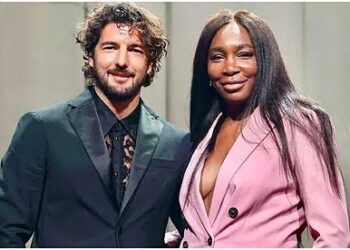For decades, tennis has been celebrated as much for its solitary brilliance as for the physical battles waged on court. The sport’s gladiators are expected to project an image of unshakeable mental fortitude, to wear their stoicism like a badge of honor. But behind the crisp white uniforms and polite applause lies a world where isolation, relentless self-criticism, and the immense pressure to win can erode even the strongest minds. For a long time, the idea of openly acknowledging these struggles—let alone seeking professional help—was taboo. Now, Madison Keys is helping to change that.
The 29-year-old American star, a US Open finalist and perennial contender at majors, has never been shy about sharing her experiences with anxiety and stress. But in a recent interview, Keys went a step further, openly discussing how regular therapy has become a vital tool in managing her mental health. By doing so, she joins a small but growing group of players, including Naomi Osaka and Mardy Fish, who are rewriting the unwritten rules about what it means to be tough in tennis.
In the hyper-competitive world of professional tennis, vulnerability is often seen as weakness. Matches are decided as much by the mind as by the body; an unguarded moment can give an opponent the edge they need. Players have long felt that admitting to mental health struggles might be used against them—by rivals, fans, or even sponsors. For decades, conversations around injuries revolved almost exclusively around physical ailments: knees, shoulders, wrists. The mind was simply expected to keep pace.
But the pressure cooker environment has claimed casualties. Andre Agassi’s autobiography Open shocked many fans with its brutal honesty about his battles with depression and burnout. Mardy Fish, once the top-ranked American man, famously withdrew from the 2012 US Open citing anxiety, only revealing the full story years later. More recently, Naomi Osaka’s public struggles with anxiety and her withdrawal from the French Open in 2021 brought mental health squarely into the mainstream spotlight. Still, there remains an undercurrent of stigma—especially among older generations—about athletes speaking openly about therapy.
This is what makes Madison Keys’ openness so refreshing. Rather than portraying therapy as a desperate last resort, she normalizes it as a routine, proactive measure—like hitting the gym or getting physio. She has spoken about the importance of having an outlet, of learning coping skills that help her navigate the grind of the tour and the intense scrutiny that comes with being a top player. For younger fans and aspiring players, her message is clear: strength and vulnerability can coexist.
Keys’ candor is also reshaping how fans and commentators talk about athletes. For too long, sports culture has celebrated grit and “mental toughness” while ignoring the very real toll that relentless competition takes on a player’s wellbeing. The narrative that only the mentally “strongest” survive overlooks the fact that the mind, like any muscle, can be strained, overworked, and in need of care. By talking openly, Keys is helping to destigmatize therapy, encouraging others to see it not as a sign of weakness, but as an investment in longevity and performance.
Her advocacy is particularly meaningful because it comes from someone who is still competing at the highest level. Unlike former players reflecting on their past struggles, Keys is living this reality now—traveling the world, playing matches, facing the same relentless expectations, but with a different approach to mental wellness. She’s not only surviving the pressures of the tour but thriving, proving that prioritizing mental health can be a competitive advantage, not a liability.
Tennis, like society at large, is beginning to reckon with the hidden costs of ignoring mental health. The WTA and ATP now offer more robust support systems, including access to mental health professionals at tournaments. Players are encouraged to seek help, but the work of changing attitudes ultimately comes down to athletes like Keys, who lead by example.
The door that Keys has cracked open invites a broader conversation about how sports culture must evolve. Her courage reminds us that even in a sport where solitude is the norm, no one should feel alone with their struggles. Her voice is part of a generational shift—one where mental health is treated with the same seriousness as a sprained ankle or torn ligament.
In the end, Madison Keys’ story is about more than just therapy; it’s about redefining what resilience looks like in the modern game. By rejecting outdated notions of toughness, she’s forging a healthier path for the next generation. For fans, her honesty is a reminder that even heroes need help sometimes—and that asking for it is not only okay, bu
t profoundly brave.











